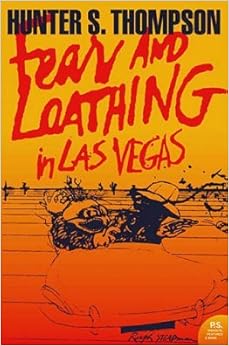It has been well-near two decades since I last read this title, so far as I remember. Why I chose to read it in the first place, I am uncertain. There may have been a certain swagger in Thompson's writing that I appreciated as a twentysomething that was enough to pull me in based on a few lines. At the time when I was working in bookstores, one of Thompson's last books hit the best-seller list, so he was a known quantity.
That I liked the work I can understand so far as the writing itself goes, but the subject matter seems a bit odd for/to me. Reading this as a fortysomething, I find the sheer amount of drugs denoted as taken to be unrealistic and frankly almost a mockery of a kind of culture that existed at the time that Thompson was writing. I think back to the drug jokes that were extent in the early years of SNL--this is that time, those late sixties and early seventies (stretching into the late seventies when SNL started). This is pre-1980s, pre-Nancy Reagan, pre-drug czar.
But could Thompson be at all serious in writing this? I think now there's a kind of satire going on, not only of the "gonzo" hubris that Thompson originated but of various ideas about American culture itself. There's the fascistic side of it, declaring the dangers of people like Thompson, and then there's the people like Thompson (or Raoul Duke, as he calls himself in the text) who are so drug addled that whatever danger they pose is more likely a danger to themselves than to greater society (save in the anarchy and disorder they bring and represent). There is no organized rebellion to occur when these are the foes of societal order.
The last time I read this book would have been shortly before or after the movie came out in 1998. The movie was, as I figured it would be, disappointing. This is not a work that is easily adaptable--or perhaps adaptable at all (and Johnny Depp, I felt, played his role too cornpone to allow viewers to take the film with any gravity). But I remember being surprised by some of the things in the movie, some of the criticism of the idea of the American dream, and I remember going back to the book to find it actually there.
It's also a book I lent out to an unlikely reader. During the last few months I lived in California, I had a roommate some years younger than me, a roommate who spent most nights partying and who had a regular bevy of friends over at the apartment. These were party guys themselves, and also guys in the stereotypical sense that guys often are and that I never was: obsessed chiefly with cars and scoring girls (not as much sports, though). One of these heavy-drinking party dudes perused my books and asked if he could borrow the Thompson volume, and I let him. I got the book back, badly mangled, a few weeks later. What he thought of the work, I don't remember now, but that too is part of the intrigue to me, because the book in a sense is about a constant party, and here this guy was, living it. Did he read the work ironically in any way? Did he see societal criticism in it? Or was this the real stuff, the literal, what life should be? Or was it just a fun read?
In his over-the-top satire, Thompson seems to be critiquing the idea of the American dream as well as the idea that drug people are the kind of danger/menace to society that the media and leadership of the country at the time were taking them to be. However, in presenting the work in presenting the work as a kind of nonfiction expose, there's a level at which his supposed drug taking kind of deconstructs his argument. Sure, in the book, he can drive on an airport runway without danger, but were a drug-addled person to do such and actually knock a plane out, the danger would be clearly manifest. But perhaps, also, Thompson is pointing out that the way to the American dream, the substance of the American dream, is something unobtainable. In the final scene, he pumps himself full of drugs and feels a restoration of confidence: the dream, in a sense, is a drug of its own.
Saturday, September 30, 2017
On "Fear and Loathing in Las Vegas" by Hunter S. Thompson *****
Labels:
Books,
Five-Star Nonfiction,
Hunter S. Thompson,
Nonfiction
Subscribe to:
Post Comments (Atom)







No comments:
Post a Comment